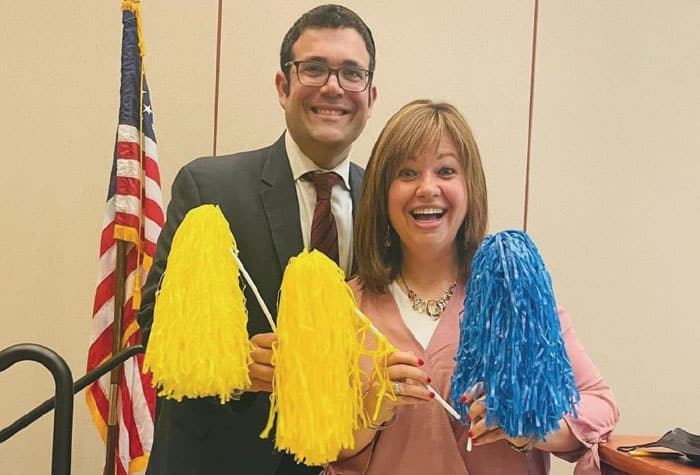 Rabbi Aryeh and Sharona Kaplan
Rabbi Aryeh and Sharona Kaplan You’d never guess from speaking with Rabbi Aryeh and Sharona Kaplan that they’ve been working deep in the trenches of college campus life since 2004. High school sweethearts from Teaneck, New Jersey who met through NCSY, the young couple went to work for the Orthodox Union’s Jewish Learning Initiative (OU-JLIC) at UCLA Hillel when they were barely older than the students themselves. Nearly 20 years later, their enthusiasm and energy for their work remains palpable.
The Kaplans provide Jewish learning and social opportunities on campus: lunch-and-learns, weekly Shabbat experiences and holiday programs, and advice on personal or halachic questions. They also serve as mentors and role models. Their success on campus led to their becoming Directors of OU-JLIC’s West Coast operations in 2016, training other rabbinic couples and offering tactical and visionary support for programming.
The OU-JLIC model is novel because both partners are individually hired and compensated. “The wife isn’t simply a ‘plus one’ to the rabbi,” Sharona observed. “Young adults are looking for models of marriage, and the structure of the OU-JLIC network is sensitive to that.” About twenty couples who met through the Kaplans’ programs have married, four of whom went on to work on campus for OU-JLIC.
With six children having been born during the Kaplans’ tenure, students have had plenty of opportunities to see a large, vibrant Jewish family thrive, particularly at their Shabbat tables, though Kaplan kids are also seen in the Hillel lounge, playing ping-pong and talking with students. Rabbi Aryeh noted that their kids “have learned to appreciate the plurality in Judaism, engaging all Jews and not labeling any as ‘other.’”
Despite consistent antisemitism on campuses nationwide, the Kaplans happily report that most Jewish students they see are proudly Jewish, wearing stars of David and enthusiastic about participating in activities. Rabbi Aryeh said, “Many have transferred from a junior college and their happiness in being part of a vibrant Jewish community is not diminished by concerns of antisemitism. Many also missed out on a gap year or had truncated high school experiences due to COVID. They have a can-do attitude and want to fully participate in Jewish life on campus.” Quarterly Shabbatons that had drawn only 50 to 60 students in years past now draw upwards of 150, with some students bunking on their friends’ dorm room floors to participate.
Many students choose UCLA specifically for its strong Jewish life. With a daily minyan, kosher food on campus, and a vibrant Hillel, “they come and feel, ‘I’ve arrived,’” Sharona noted. “Fortunately, campus politics are a non-issue for most students who are not chasing it.”
Despite talk about the entitlement mindset of Gen Z, the Kaplans see high levels of gratitude among students.
Another bright spot: despite talk about the entitlement mindset of Gen Z, the Kaplans see high levels of gratitude among students. “Unsolicited, many tell us how lucky they are to have this programming. They are blown away by what is available, both qualitatively and quantitatively. We regularly get calls asking for programming on other campuses as well,” Sharona said.
The couple also received a grant from the OU in partnership with JNF USA to launch a West Coast branch of OU-JLIC’s Yavneh Fellowships, which trains students on campus for leadership positions within their campus community. One of their student leaders who took exceptional efforts to keep the OU-JLIC programming running during COVID was hired upon graduation to oversee and nurture the next generation of student leaders. Currently, there are 97 students in the Yavneh program at California universities, primarily in Southern California.
If UCLA is any example, Jewish students view their Judaism positively. “We’re seeing exceptional things,” Rabbi Aryeh said. “At Southwestern Law School, between 60 and 70 students are attending a weekly Torah lunch and learn.” On a recent Thursday night, more than 100 attended a challah bake. “Food is always a draw, it creates an easy opportunity to mingle, and provides an accessible touch point to Judaism,” Sharona explained. Next up: a hamantaschen bake to keep the momentum going.
Many of the student-led programs, such as the holiday events and learning opportunities, are so popular because students “have their finger on the pulse of things. They know the optimal time and location for their peers, and the programming they run can be hotter than top-down professional programming,” she added.
The Kaplans avoid burnout by getting out of town for occasional professional conferences with colleagues, or visits to family. And because their demographic is dynamic, turning over every few years, staleness is less of a problem. “We have room to pivot and reevaluate what works. We’ve also learned to work with more synchronicity and intention, and manage our efforts so we don’t drain ourselves,” Rabbi Aryeh said. “Sometimes less is more.”
The Kaplans are thankful for the sponsors who make their work possible: The Orthodox Union, the Jewish Federation of Greater Los Angeles, Hillel at UCLA, and hundreds of individual donors, including many of their own alumni.
Fast Takes with Rabbi Aryeh and Sharona Kaplan
Jewish Journal: What is your favorite Jewish food?
Rabbi Aryeh: Orange beef from Shanghai Kosher Garden.
Sharona: Frozen yogurt, all day, every day.
JJ: Where do you go to relax?
Sharona: I love relaxing with our family at the beach.
Rabbi Aryeh: I love watching the UCLA Bruins play at Pauley Pavilion.
JJ: Favorite Word?
Both: Optimal. It’s become our brand, describing the students we work with and our life in LA.























 More news and opinions than at a Shabbat dinner, right in your inbox.
More news and opinions than at a Shabbat dinner, right in your inbox.